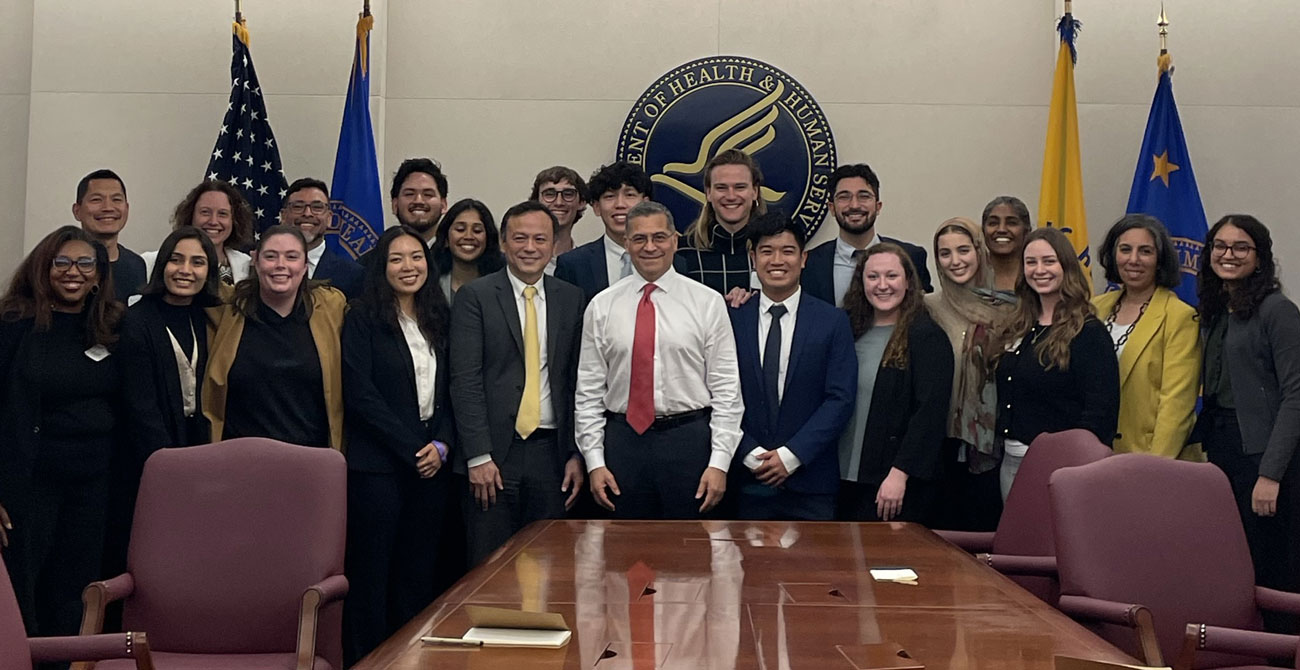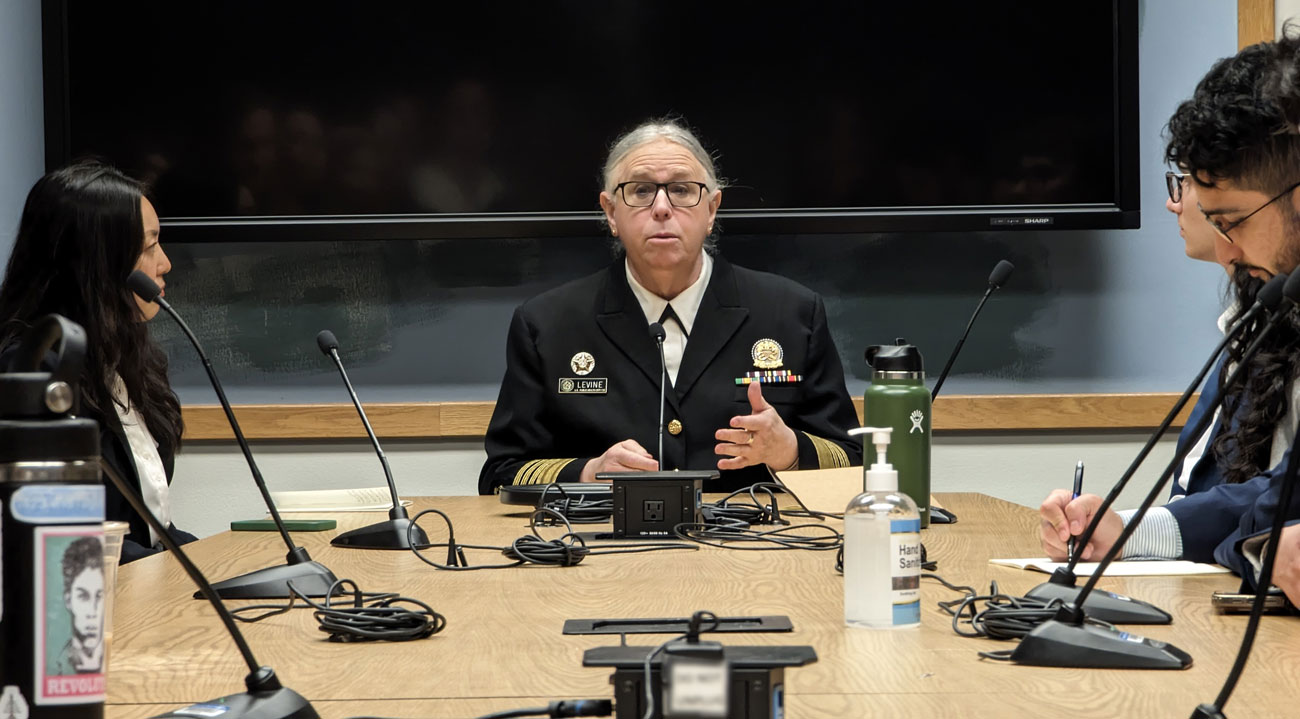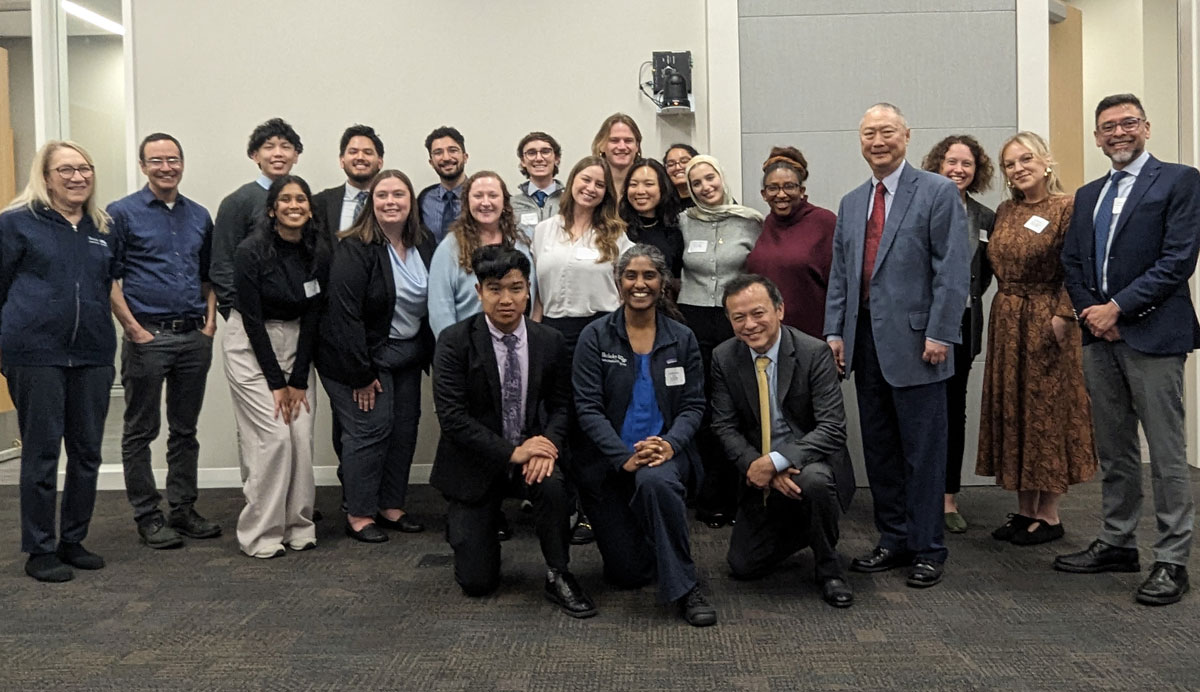Future doctors dive into health policy in Washington, DC
Joint Medical Program sends 14 students to capital
- 8 min. read ▪ Published
The last place that Neema Rashidi ever imagined himself was walking the halls of Congress, wearing his white lab coat and toting a stack of legislative briefs.
But in April, that’s where Rashidi was, along with 13 other medical/MPH students on the UC Berkeley-UCSF Joint Medical Program’s first Immersive Experience in Washington, DC.
“Before the trip, federal politics was a black box to me,” Rashidi said when he got home. “I’d read a newspaper article that would say, ‘Policies should be directed to fix this health issue or that health issue,’ but it didn’t seem to be something I was supposed to be doing.”
But now he sees a future in the world of public policy, advocating for public health.
“I enjoyed the Capitol Hill visits, and I was surprised by how much I could see myself doing similar work at a federal or state level. That wasn’t something I considered before,” he said.

The JMP group with United States Secretary of Health and Human Services Xavier Becerra.
To physician and UC Berkeley School of Public Health Dean Michael C. Lu, that’s precisely the point.
“All too often, we doctors toil downstream to ameliorate the harms caused by policy decisions that are made upstream,” said Dean Lu in an interview. “But to improve population health and advance health equity, we need more doctors to go upstream to effect policy change.”
Dean Lu considers the Joint Medical Program (JMP)—a five-year program jointly administered by UC Berkeley and UCSF—to be the perfect training ground for future physician leaders and changemakers. JMP students first spend two and a half years at UC Berkeley earning a master’s degree in Health and Medical Science, then move across the Bay to UCSF for the next two and half years to finish their clinical training and receive their medical doctorate (MD).
“By being the only medical school in the country within a school of public health, we get to train a different kind of doctor,” Dean Lu said. “At the JMP we are training doctors who are equipped to not only provide excellent clinical care at the individual level, but also bring about real change in healthcare and public health at the community, systems, and policy levels.”
A graduate of the JMP thirty years ago, Dean Lu’s career epitomizes the program’s mission and vision. After spending 15 years as a professor of obstetrics and gynecology and public health at UCLA, he served as director of the federal Maternal and Child Health Bureau under the Obama Administration. In that role, he directed federal programs that served more than 60 million children and families annually and launched new national initiatives on women’s preventive services, early childhood home visiting, and safe motherhood. His work earned him the coveted Hubert H. Humphrey Service to America Award.
That experience showed Dean Lu how physicians can save lives and improve health—millions at a time—and why physicians-in-training need to learn how to advocate for policy change on behalf of their patients and communities. And the best way to do that, he knew, would be to show them first-hand how health policy is made. So, in spring 2024, he brought 14 second-year JMP students, UCSF Vice Dean Peter Chin Hong, and several JMP faculty members to lobby lawmakers, meet top officials at the White House and Department of Health and Human Services (HHS), and squeeze in a little sight-seeing.

Visiting with Assistant Secretary for Health Rachel L. Levine, MD.
“We wanted to provide a transformative experience for our students, to inspire them to see themselves as future physician leaders and changemakers, to show them how to turn their passion for health equity and social justice for all into action,” said Dean Lu.
Over the course of the week, the students met with Xavier Becerra (Secretary of HHS) and Admiral Rachel Levine (Assistant Secretary for Health); spoke to officials from the White House and federal agencies, and spent a day lobbying members of Congress and their aides to educate them on important public health issues.
Before the trip, the students researched topics of interest, including Congressional bills on access to reproductive healthcare, gender-affirming care for children and adolescents, and immigration and community health worker access. Then, they met with policy staffers from several healthcare and community groups, who shared their perspectives about these bills. They were divided into teams, who studied the different issues and the lawmakers’ voting records. They visited senators and representatives, including Sen. Ron Johnson and Rep. Scott Fitzgerald, Republicans of Wisconsin; Rep. Tom McClintock, Republican, of California, among others.
Each team included at least one student who was a constituent of the lawmaker being visited. Some of the conversations were with the politicians themselves, and some were with staff aides. Although all were cordial, they did not all agree with the students’ viewpoints—which Dean Lu said was by design.
“We made sure the students were able to engage members who represented both sides of the aisle,” Dean Lu said. “I went with one group that visited Sen. Johnson, a staunch conservative. The students went in to talk about Senate bills on abortion care and transgender health. They went in knowing that they weren’t going to change the senator’s mind, but I wanted them to learn how to talk across differences.”
“I was so proud of how our students conducted themselves with such grace and poise, and engaged the members or their aides in difficult yet thoughtful policy conversations,” Dean Lu said. “That’s exactly what we are trying to do – train our next generation of health leaders and changemakers who are able to go into blue counties and red counties, Biden country and Trump country, bring folks together, listen with empathy, bridge divides and find common ground to solve big problems for our country.”
Angelica T. McDaniel, who, like the other participants, is a second year medical student, said that before the DC trip, she had never thought about working in public policy.
“I thought you just go to medical school and become a doctor and work in a clinic,” McDaniel said. “This was the first time that we could see as physicians we could work in many different paths, one being a political office.
“Or, if we don’t go into politics there are still so many ways that we as physicians can be intertwined with the political environment,” she said. “It was so cool to learn how to lobby on Capitol Hill and to learn how we can have an impact.”
McDaniel’s team visited three California congressional offices, where they talked about hormonal care for children.
“There are a lot of people who want to remove funding from pediatric medical residency programs that teach gender-affirming care,” McDaniel said. “These changes in training would affect children of all gender identities who need hormonal therapy. All of the staffers were very respectful and listened to each of us. Having a white coat opens a lot of doors that we didn’t realize when we went in.”

Dr. Jyothi N. Marbin, who directs the JMP program and serves jointly on the faculty of both UC Berkeley School of Public Health and UCSF Medical School, called the trip a “big, big dream.”
“What we try to do at the JMP is to train outstanding physicians who understand the social and structural determinants of health,” Dr. Marbin said. “We want them to understand how policies about housing, the environment or food access are also healthcare policies.
“We are trying to tell students that health policy is their lane,” she said. “We need to embed that understanding and orientation in our medical students from the very beginning.”
In the past, Dr. Marbin said the JMP has brought medical students to Sacramento to learn about state politics, but the Washington trip had even more of an impact on the students.
“We stand at the intersection of medicine and community,” she said. “This is exactly what we should be doing.”